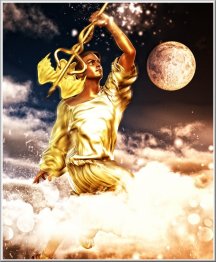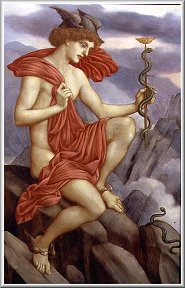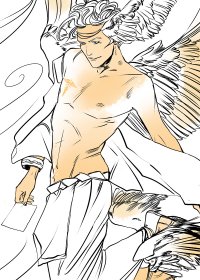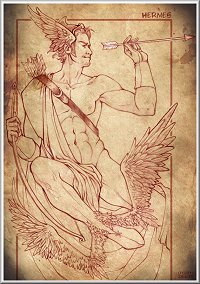
Hermes
CLICK
TO ENLARGE

Hermes
CLICK
TO ENLARGE

Hermes
CLICK TO
ENLARGE

Hermes
CLICK TO
ENLARGE
|
HERMES PAGE TWO
Hermes, in his role as Messenger God, took part in many
myths and was employed by all the gods, particularly Zeus, on a
number of occasions. He was the one who:
 Brought
the goddesses Aphrodite, Hera and Athena to the shepherd Paris,
who judged that Aphrodite was the most beautiful, causing the
Trojan War. Brought
the goddesses Aphrodite, Hera and Athena to the shepherd Paris,
who judged that Aphrodite was the most beautiful, causing the
Trojan War.
 Tied
Ixion's hands and feet to the wheel, which is said to roll
perpetually in the air. Tied
Ixion's hands and feet to the wheel, which is said to roll
perpetually in the air.
 Led the
Trojan King Priam to the tent of Achilles to fetch the body of
his dead son, Hector. Led the
Trojan King Priam to the tent of Achilles to fetch the body of
his dead son, Hector.
 Gave
Odysseus moly, the magic plant which offered protection against
enchantment by a witch. Gave
Odysseus moly, the magic plant which offered protection against
enchantment by a witch.
 Gave
the Golden-Fleeced ram to Nephele, in order to save her children
Phrixus and Helle. Gave
the Golden-Fleeced ram to Nephele, in order to save her children
Phrixus and Helle.
 Gave
Hades' helmet of invisibility to the hero Perseus in order to
help him slay Medusa. Gave
Hades' helmet of invisibility to the hero Perseus in order to
help him slay Medusa.
 Rescued
from the flames baby Dionysus, god of wine, following his birth. Rescued
from the flames baby Dionysus, god of wine, following his birth.
 Brought
back Zeus' sinews, which the monster Typhon had stolen,
rendering Zeus helpless. Brought
back Zeus' sinews, which the monster Typhon had stolen,
rendering Zeus helpless.
 Freed
the war god Ares from the bronze jar in which he had been
imprisoned during the Olympians' battle versus the Giants. Freed
the war god Ares from the bronze jar in which he had been
imprisoned during the Olympians' battle versus the Giants.
 During
this same Giants revolt, Hermes, wearing Hades' helmet of
invisibility, killed the giant Hippolytus. During
this same Giants revolt, Hermes, wearing Hades' helmet of
invisibility, killed the giant Hippolytus.
 Sold
the hero Heracles (Hercules) to Queen Omphale. Sold
the hero Heracles (Hercules) to Queen Omphale.
 Rescued
Io, one of Zeus' lovers, who had been transformed into a cow and
was guarded by Argus, the 100-eyed giant. Hermes slew Argus and
set Io free. Hermes is sometimes called Argiphontes, for having
killed the All-seeing Argus. Rescued
Io, one of Zeus' lovers, who had been transformed into a cow and
was guarded by Argus, the 100-eyed giant. Hermes slew Argus and
set Io free. Hermes is sometimes called Argiphontes, for having
killed the All-seeing Argus.
As the Herald of the gods, Hermes was worshipped as the god of
the roads, who protected travelers. Many statues, called Hermae,
were erected on roads, and at doors and gates.
The Messenger god was also the god of eloquence, since the
heralds historically are the public speakers in assemblies and
on other occasions that require talking in front of people.
Thus Hermes was also the god of prudence and cunning, both in
words and deeds, and even of fraud, theft and perjury. His
shrewd and creative character led many to claim that he invented
objects such as the lyre and syrinx, the alphabet, astronomy,
music, boxing, gymnastics, the cultivation of the olive tree,
measures, weights and many other things.
PRINCIPAL SYMBOLS AND ATTRIBUTES
 The
Petassos, a wide-brimmed traveling hat, which in later times was
adorned with two small wings. The
Petassos, a wide-brimmed traveling hat, which in later times was
adorned with two small wings.
 The
herald's staff, called KERYKEION in Greek, or CADUCEUS in Latin,
given to Hermes by Apollo. The
herald's staff, called KERYKEION in Greek, or CADUCEUS in Latin,
given to Hermes by Apollo.
 The
white ribbons surrounding the staff were changed into two
serpents by later artists. The
white ribbons surrounding the staff were changed into two
serpents by later artists.
 The
sandals that carried him across land and water faster than the
wind. They had wings attached to the ankles. The
sandals that carried him across land and water faster than the
wind. They had wings attached to the ankles.
HERMES WORSHIP AND FESTIVALS
The worship of Hermes began in Arcadia, his birth place, and was
carried to Athens, ultimately spreading throughout Greece.
The festivals called the Hermaea were instituted in his honor.
Sacrifices offered to him included honey, incense, cakes, pigs,
lambs and young goats.
Objects sacred to Hermes included the palm tree, the tortoise,
the number four, and several kinds of fish.
With Chione (or Philonis), daughter of King Deadalion, Hermes
had Autolycus, who was the grandfather of Odysseus. Hermes gave
his son the gift of being such a skilful thief that he could not
be caught, making him able to change whatever he stole into some
other form or color.
Some of his other children include:
 Half-man/half-woman Hermaphroditus, from his union with
Aprhodite
Half-man/half-woman Hermaphroditus, from his union with
Aprhodite
 The
Argonauts Aethalides, Echion and Eurytus The
Argonauts Aethalides, Echion and Eurytus
 Abderus,
Heracles' lover Danae's grandfather Abderus,
Heracles' lover Danae's grandfather
 Cephalus, from his union with Herse
Cephalus, from his union with Herse
 With
Herse's sister, Aglaurus, he had Ceryx With
Herse's sister, Aglaurus, he had Ceryx
 The
phallic deity Priapus, with an unknown mother The
phallic deity Priapus, with an unknown mother
 The god
Pan, according to some later poets. The god
Pan, according to some later poets.
 With
the nymph Sose he had Agreus, who was in Dionysus' retinue With
the nymph Sose he had Agreus, who was in Dionysus' retinue
 Other
offspring of Hermes in the service of Dionysus included Lycus,
Nomius, Pherespondus and Pronomus Other
offspring of Hermes in the service of Dionysus included Lycus,
Nomius, Pherespondus and Pronomus
 With
Alcidamea he sired Bunus, who became King of Corinth With
Alcidamea he sired Bunus, who became King of Corinth

[home] [page one]
[page two]
|







